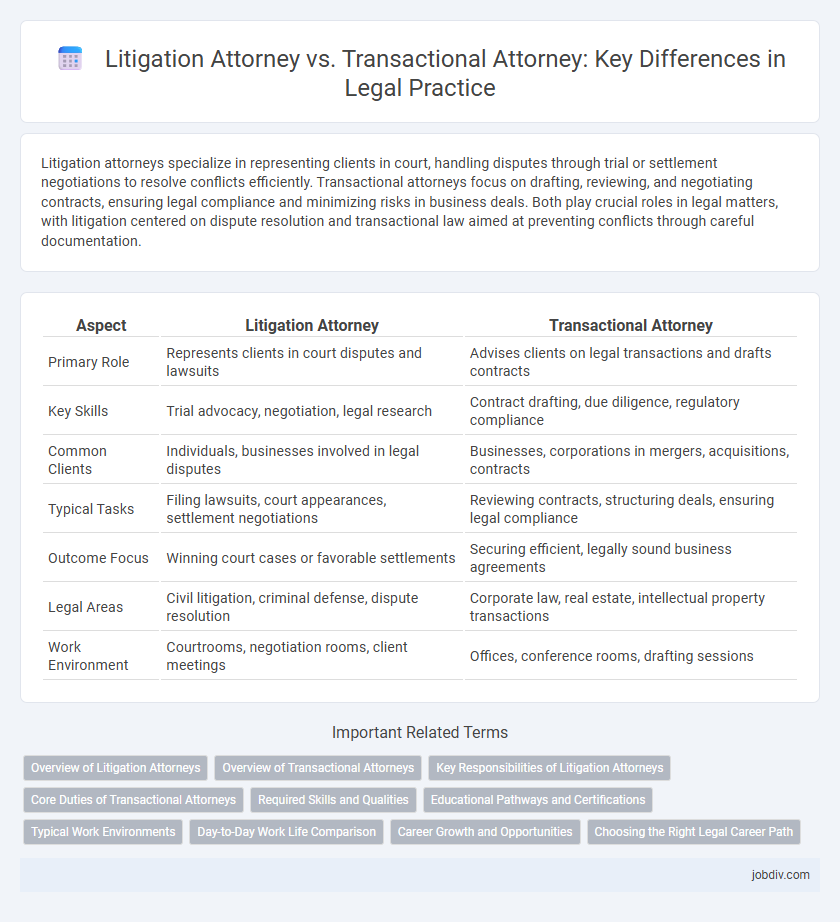Litigation attorneys specialize in representing clients in court, handling disputes through trial or settlement negotiations to resolve conflicts efficiently. Transactional attorneys focus on drafting, reviewing, and negotiating contracts, ensuring legal compliance and minimizing risks in business deals. Both play crucial roles in legal matters, with litigation centered on dispute resolution and transactional law aimed at preventing conflicts through careful documentation.
Table of Comparison
| Aspect | Litigation Attorney | Transactional Attorney |
|---|---|---|
| Primary Role | Represents clients in court disputes and lawsuits | Advises clients on legal transactions and drafts contracts |
| Key Skills | Trial advocacy, negotiation, legal research | Contract drafting, due diligence, regulatory compliance |
| Common Clients | Individuals, businesses involved in legal disputes | Businesses, corporations in mergers, acquisitions, contracts |
| Typical Tasks | Filing lawsuits, court appearances, settlement negotiations | Reviewing contracts, structuring deals, ensuring legal compliance |
| Outcome Focus | Winning court cases or favorable settlements | Securing efficient, legally sound business agreements |
| Legal Areas | Civil litigation, criminal defense, dispute resolution | Corporate law, real estate, intellectual property transactions |
| Work Environment | Courtrooms, negotiation rooms, client meetings | Offices, conference rooms, drafting sessions |
Overview of Litigation Attorneys
Litigation attorneys specialize in representing clients in court disputes, handling all phases from pre-trial motions to appeals. Their expertise includes drafting pleadings, negotiating settlements, and presenting evidence before judges and juries. These attorneys play a crucial role in resolving conflicts through adversarial processes governed by civil procedure and substantive law.
Overview of Transactional Attorneys
Transactional attorneys specialize in drafting, reviewing, and negotiating contracts, mergers, acquisitions, and other business agreements. Their role centers on preventing legal disputes by ensuring compliance with regulatory requirements and protecting clients' interests in complex financial and commercial transactions. Unlike litigation attorneys, transactional attorneys work primarily outside the courtroom, facilitating smooth business operations and mitigating risk through strategic legal counsel.
Key Responsibilities of Litigation Attorneys
Litigation attorneys specialize in representing clients in court, managing all phases of litigation including pleadings, discovery, trials, and appeals. Their key responsibilities include drafting legal documents, conducting depositions, negotiating settlements, and advocating on behalf of clients during courtroom proceedings. Expertise in procedural rules, courtroom strategy, and case law analysis is critical to effectively protect clients' interests in disputes.
Core Duties of Transactional Attorneys
Transactional attorneys specialize in drafting, reviewing, and negotiating contracts and agreements to ensure compliance with relevant laws and protect client interests. They facilitate business transactions, mergers, and acquisitions by conducting due diligence and structuring deals to minimize legal risks. Their core duties emphasize preventative law, aiming to avoid litigation through meticulous documentation and regulatory adherence.
Required Skills and Qualities
Litigation attorneys require strong analytical thinking, persuasive communication, and resilience to effectively argue cases in court and navigate complex legal disputes. Transactional attorneys excel in drafting precise contracts, meticulous attention to detail, and expertise in negotiation to facilitate smooth business transactions and compliance. Both roles demand deep legal knowledge, ethical judgment, and the ability to manage client relationships under varying pressures.
Educational Pathways and Certifications
Litigation attorneys typically complete a Juris Doctor (JD) degree with coursework emphasizing trial advocacy, civil procedure, and evidence, often gaining certification through state bar exams and specialized trial advocacy programs. Transactional attorneys pursue similar JD degrees but focus their education on contract law, corporate law, and negotiation skills, with certifications available in areas like mergers and acquisitions or compliance. Both paths require passing the state bar exam, yet additional specialized certifications and continuing legal education (CLE) enhance expertise tailored to either courtroom litigation or business transactions.
Typical Work Environments
Litigation attorneys typically work in courtroom settings, law firms specializing in disputes, or government agencies handling civil or criminal cases. Transactional attorneys are often found in corporate environments, law firms focusing on contract drafting, mergers and acquisitions, or in-house legal departments managing business transactions. Both roles require collaboration but differ significantly in their daily work environments and interaction dynamics.
Day-to-Day Work Life Comparison
Litigation attorneys primarily engage in courtroom proceedings, legal research, drafting pleadings, and client representation during trials, often working under tight deadlines and unpredictable schedules. Transactional attorneys focus on drafting, reviewing, and negotiating contracts, mergers, acquisitions, and compliance documents, maintaining a more structured and office-based work routine. Both roles demand strong analytical skills, but litigation requires quick adaptability to case developments, while transactional work emphasizes detail-oriented contract management.
Career Growth and Opportunities
Litigation attorneys often experience dynamic career growth through courtroom exposure and high-stakes dispute resolution, sharpening advocacy skills and gaining reputational influence. Transactional attorneys build expertise in contract negotiation, corporate compliance, and deal structuring, positioning themselves for roles in corporate leadership, mergers and acquisitions, or in-house counsel. Both career paths offer distinct opportunities, with litigation fostering trial proficiency and transactional law emphasizing strategic business acumen.
Choosing the Right Legal Career Path
Litigation attorneys specialize in representing clients in court, managing disputes through trials, depositions, and negotiations, while transactional attorneys focus on drafting, reviewing, and negotiating contracts to facilitate business deals and prevent legal conflicts. Choosing the right legal career path depends on an individual's skills, interests in courtroom advocacy versus contract law, and long-term professional goals. Understanding the demands and rewards of each specialization guides aspiring lawyers toward roles that align with their strengths and career aspirations.
Litigation Attorney vs Transactional Attorney Infographic

 jobdiv.com
jobdiv.com